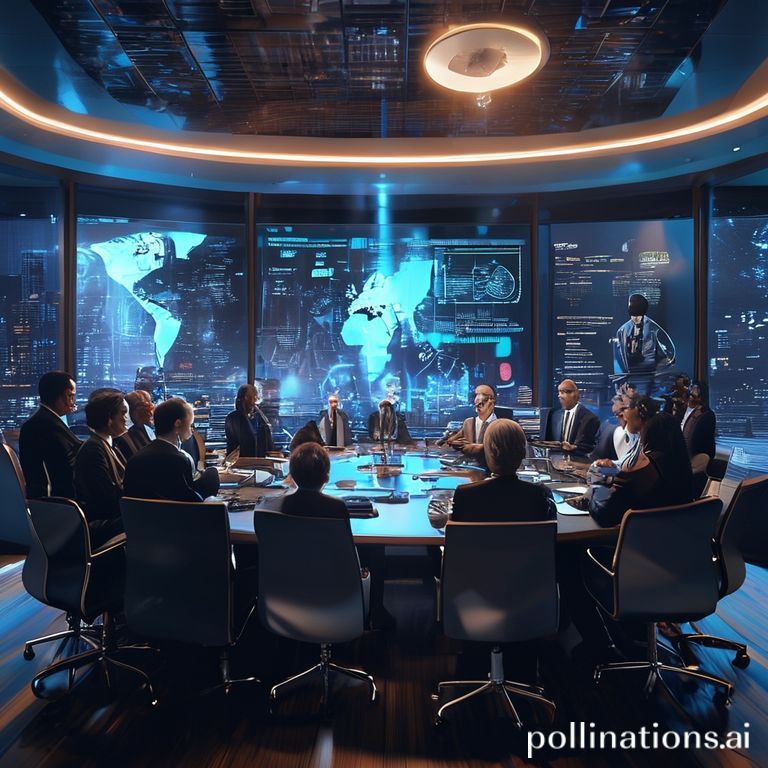Welcome to a pivotal discussion that will shape our collective future. While many seek the “Top 10 Global Secrets for Success” in business or personal development, true success in the 21st century hinges on our ability to responsibly navigate the most transformative technological advancements. This article delves into an event of paramount importance that promises to redefine our trajectory as a species: the landmark AI Safety and Regulation Summit scheduled for 2025.
In an unprecedented move, leaders from across the globe are preparing to convene, signaling a critical turning point in the governance of artificial intelligence. This summit represents a monumental effort to establish ethical frameworks and regulatory guidelines for AI development, a topic that has moved from the realm of science fiction to urgent geopolitical concern. The stakes couldn’t be higher as we grapple with the immense potential and inherent risks of advanced AI systems impacting every facet of our global society.
The Urgency of Global AI Governance
The rapid acceleration of AI capabilities has outpaced existing regulatory structures, creating a pressing need for a unified international approach. From autonomous weapons to deepfake technology and powerful generative AI models, the implications for security, economy, and human rights are profound. The 2025 summit aims to bridge disparate national efforts and forge a cohesive strategy for responsible AI development on a global scale.
Experts warn that without coordinated action, the race for AI supremacy could lead to unintended consequences, including societal disruption and existential risks. This gathering of global minds is a direct response to these growing concerns, striving to ensure that AI serves humanity’s best interests. It’s about laying down the foundational principles for a future where AI is a tool for progress, not peril.
Why a Global Summit Now?
Several factors underscore the urgency of the 2025 AI summit. Firstly, the pace of technological advancement in AI is exponential, with new breakthroughs emerging almost daily. This rapid evolution demands proactive rather than reactive governance.
Secondly, AI’s impact transcends national borders, making isolated regulatory efforts insufficient. Issues like data privacy, algorithmic bias, and autonomous systems require a harmonized global standard to be truly effective. Thirdly, a growing consensus among scientists and policymakers highlights the need to address potential catastrophic risks associated with advanced AI, including the loss of human control.
Key Agendas for Global Leaders
The summit’s agenda is expected to be comprehensive, covering a broad spectrum of AI-related challenges and opportunities. Discussions will likely revolve around establishing international norms, fostering collaborative research into AI safety, and developing mechanisms for accountability. These are complex issues that require careful deliberation and consensus-building among diverse stakeholders.
One of the primary goals will be to define what constitutes “safe” AI and how to measure compliance. This includes technical standards, ethical guidelines, and robust oversight mechanisms. The outcomes of these discussions will have far-reaching implications for how AI is developed, deployed, and integrated into our daily lives globally.
Establishing International AI Safety Standards
A crucial component of the summit will be the push for internationally recognized AI safety standards. This could involve developing common protocols for testing AI systems, mandating transparency in algorithmic design, and creating frameworks for risk assessment. Such standards would provide a baseline for all nations, preventing a “race to the bottom” in AI development.
For example, imagine a global “AI Safety Seal” indicating that an AI product adheres to stringent ethical and technical benchmarks. This would not only protect consumers but also foster trust in AI technologies. The challenge lies in creating standards that are flexible enough to accommodate innovation while being robust enough to mitigate risk across diverse global contexts.
Addressing AI’s Ethical and Societal Impact Globally
Beyond safety, the summit will delve into the profound ethical and societal implications of AI. This includes discussions on algorithmic bias, job displacement, privacy concerns, and the potential for AI to exacerbate existing inequalities. Leaders will explore how to ensure AI development is equitable and inclusive, benefiting all segments of the global population.
Consider the impact of AI on labor markets. A global strategy might involve investing in reskilling programs, establishing universal basic income pilots, or exploring new economic models to support populations affected by automation. These are not just technological challenges but deeply societal ones that require thoughtful, collective action from all global stakeholders.
The Role of International Cooperation and Global Partnerships
The success of the 2025 summit hinges on an unprecedented level of international cooperation. No single nation possesses all the answers, and a fragmented approach will only undermine efforts to manage AI effectively. The summit will emphasize the formation of robust global partnerships involving governments, industry, academia, and civil society.
These partnerships are essential for sharing best practices, coordinating research efforts, and pooling resources to address complex AI challenges. Think of initiatives like the International Atomic Energy Agency, but for AI – a body dedicated to promoting safe and secure AI development worldwide. Such a collaborative spirit is vital for building a resilient global framework.
Collaborative Research and Development in AI Safety
A key outcome expected from the summit is a commitment to enhanced collaborative research in AI safety. This means pooling scientific expertise and financial resources to develop more robust, transparent, and controllable AI systems. International research grants and joint projects could accelerate breakthroughs in areas like explainable AI, verifiable AI, and alignment research.
For instance, a global consortium of universities and research institutions could focus on developing open-source tools for AI auditing and verification. This would democratize access to safety technologies and prevent proprietary solutions from creating new forms of digital inequality. Such initiatives are crucial for a truly global approach to AI safety.
Bridging the Digital Divide and Ensuring Global Access
As AI technology advances, there’s a risk of widening the existing digital divide between developed and developing nations. The summit must address how to ensure that the benefits of AI are accessible to all, not just a privileged few. This includes discussions on infrastructure development, technology transfer, and capacity building in emerging economies.
Imagine initiatives that fund AI education and infrastructure in underserved regions, enabling them to participate in and benefit from the AI revolution. This would involve partnerships between tech giants, international organizations, and local governments to create a more equitable global AI landscape. Ensuring fair access is an ethical imperative for global progress.
Anticipated Outcomes and Future Implications
While the exact outcomes remain to be seen, the 2025 AI summit is expected to produce a foundational declaration or treaty on AI safety and regulation. This document would serve as a guiding framework for national policies and international collaboration. It could set precedents for how future transformative technologies are governed.
Beyond a formal declaration, the summit aims to foster an ongoing dialogue and a sustained commitment to AI governance. This isn’t a one-off event but rather the beginning of a continuous process of adaptation and refinement as AI technology evolves. The goal is to establish a dynamic regulatory ecosystem capable of responding to future challenges and opportunities on a global scale.
The Path Towards Responsible AI Innovation
The summit’s ultimate aim is not to stifle innovation but to guide it towards responsible and beneficial ends. By establishing clear guardrails and ethical principles, leaders hope to create an environment where AI can flourish safely. This means fostering innovation that prioritizes human well-being, privacy, and societal resilience.
Consider the potential for AI to solve some of the world’s most pressing problems, from climate change to disease. With proper regulation, research can be directed towards these grand challenges, leveraging AI’s power for global good. This approach ensures that technological advancement is coupled with ethical responsibility.
Addressing the Geopolitical Landscape of AI
The geopolitical implications of AI are immense, with nations vying for technological superiority. The summit will also serve as a crucial platform for de-escalating potential AI arms races and promoting peaceful cooperation. Discussions around autonomous weapons systems and dual-use AI technologies will be particularly sensitive and critical.
A global agreement on the non-proliferation of certain AI capabilities, similar to nuclear treaties, could emerge from such discussions. This would require immense trust and diplomatic skill, but the alternative—an unregulated arms race—is too dangerous to contemplate. The summit is a vital step towards ensuring AI is a force for peace and stability globally.
Conclusion: A Collective Leap Towards a Global Future
The 2025 AI Safety and Regulation Summit marks a watershed moment in human history. It signifies a collective recognition that the future of artificial intelligence is too important to be left to chance or to individual national interests. By bringing together global leaders, experts, and stakeholders, the summit aims to lay the groundwork for a future where AI is developed ethically, safely, and for the benefit of all humanity.
The challenges are immense, but the opportunity for unprecedented collaboration and progress is even greater. This event is not just about regulation; it’s about defining our shared values in an age of intelligent machines and ensuring a harmonious coexistence. As we look towards 2025 and beyond, it is imperative for individuals, organizations, and governments alike to engage with these critical discussions.
What are your thoughts on the upcoming global AI summit? How do you believe AI should be regulated to ensure a safe and prosperous future for everyone? Share your perspectives and join the conversation as we collectively navigate this transformative era. For more insights into AI governance and its global impact, explore resources from organizations like the United Nations, the World Economic Forum, and leading AI ethics institutes.


